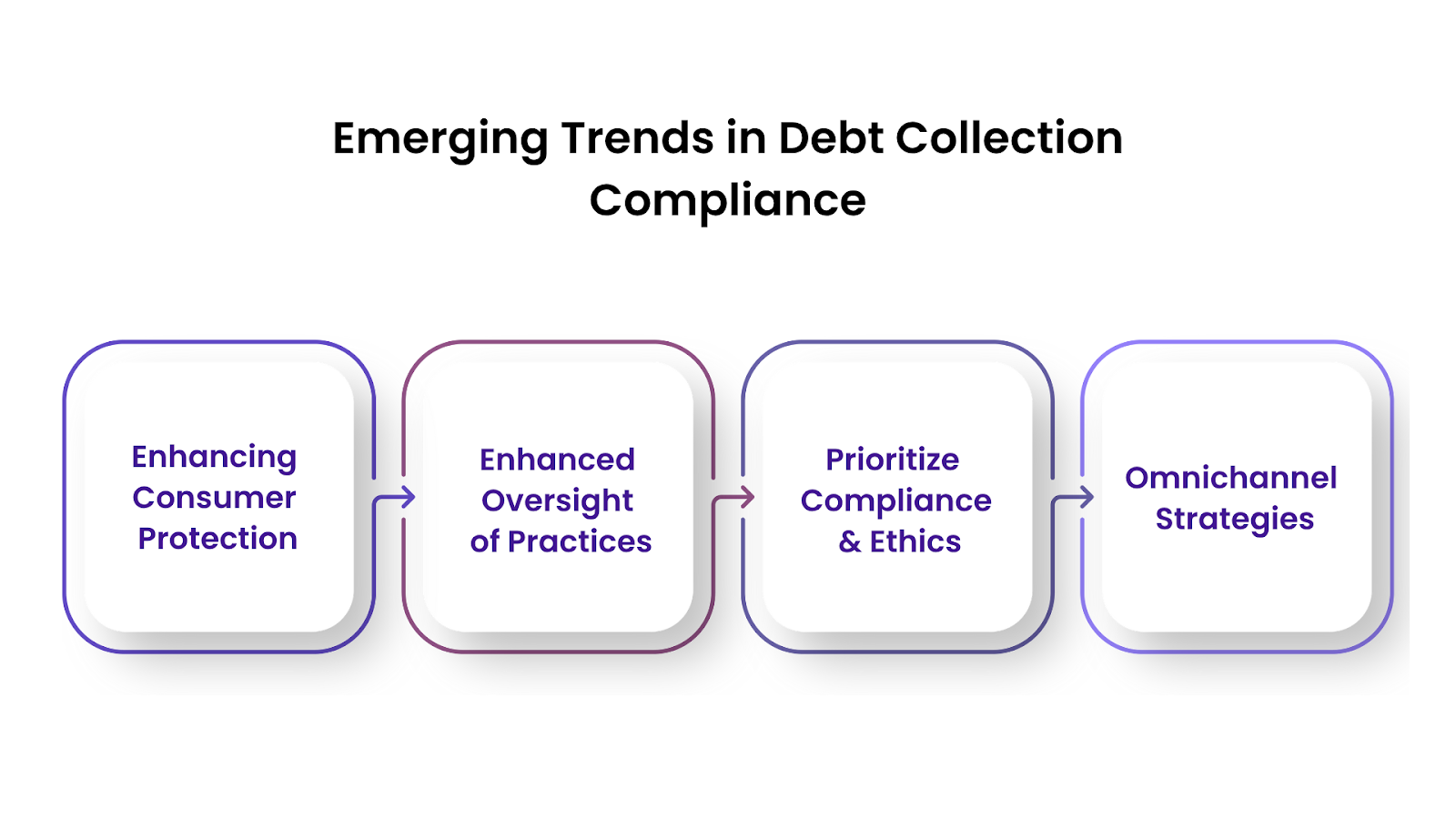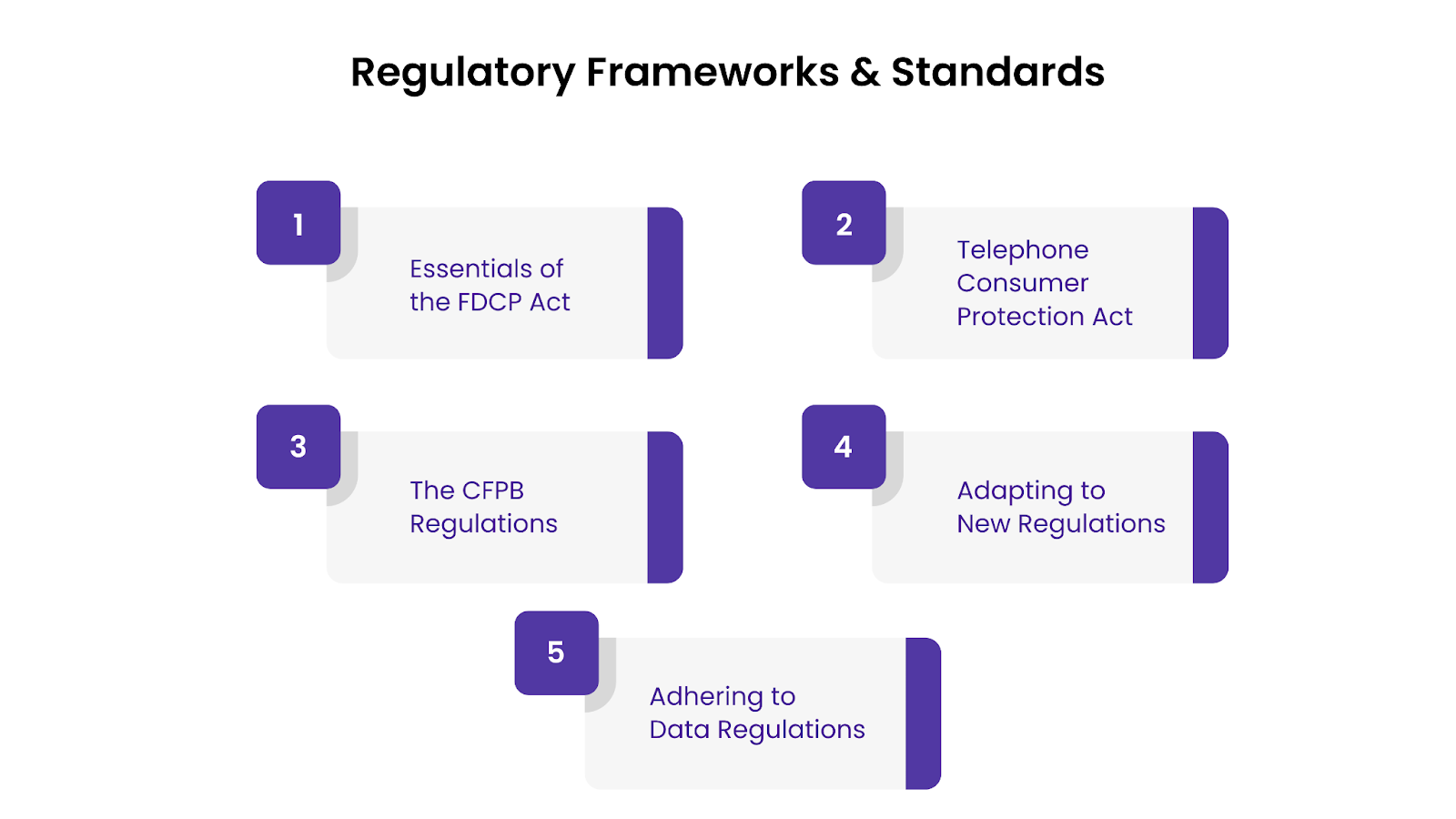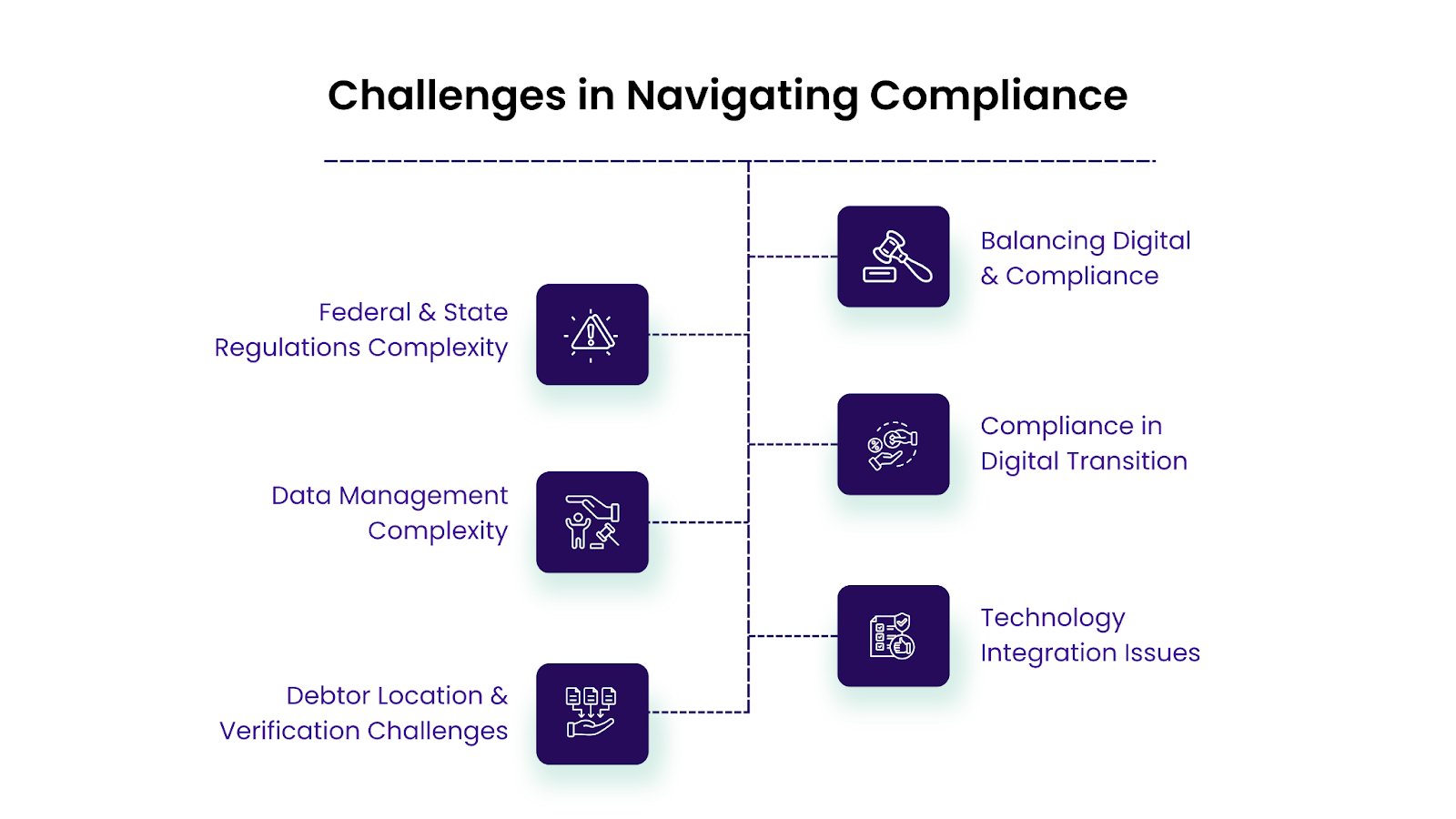The Future of Compliance in Debt Collection: Trends and Innovations

Transform Your Financial Future
Contact UsDebt collection is a sensitive area of financial management, especially for those struggling with overwhelming debt. Debt collection compliance is evolving rapidly, driven by stricter regulations, growing consumer rights, and technological advancements. Most customer complaints about debt collection in the United States in 2022 involved agencies attempting to recover debts that consumers did not owe.
For individuals facing debt resolution, financial institutions managing large portfolios, or SMBs grappling with unpaid accounts, the pressure is on them to comply with these ever-changing rules. The Forest Hill Management understands the complexities of this space and is here to guide you through this transformation.
This blog helps you understand how emerging trends, compliance innovations, and the right technologies can help you manage the challenges of debt collection compliance.
TL;DR (Key Takeaways):
- Debt collection compliance is evolving, with stricter consumer protection regulations and greater oversight to curb unfair practices.
- Emphasizing ethical practices and transparency will be critical to maintaining trust with consumers and avoiding legal pitfalls.
- Technological innovations such as AI, automation, and data analytics can help reduce errors, improve compliance, and ensure efficient debt recovery.
- Staying informed about evolving regulatory frameworks, such as the FDCPA, TCPA, and CFPB regulations, is crucial for maintaining compliance across both federal and state levels.
Emerging Trends in Debt Collection Compliance

With a strong focus on consumer protection, transparency, and the adoption of advanced communication technologies, businesses must adapt to stay compliant and avoid unnecessary risks.
Understand the emerging trends shaping the future of debt collection compliance and practical tips to help enterprises stay ahead:
1. Strengthening Consumer Protection Regulations
Consumer protection regulations are evolving rapidly, with a stronger emphasis on ensuring that debt collection practices are transparent, fair, and respectful. Regulatory bodies like the CFPB are intensifying their efforts to safeguard consumer rights and minimize abusive or predatory collection tactics.
Tips for Businesses:
- Stay informed: Regularly monitor updates to consumer protection laws and incorporate any changes into your compliance strategy.
- Review your practices: Ensure all debt collection processes, whether manual or automated, align with new consumer protection standards.
- Implement proactive compliance systems: Use technology solutions to automate compliance checks and ensure that all debt collection actions are documented and transparent.
2. Increased Oversight to Curb Unfair Practices
Regulatory bodies are now imposing greater scrutiny on debt collection practices, focusing on curbing aggressive or unfair tactics. Agencies such as the CFPB are actively setting higher standards for transparency and fairness in the debt collection industry.
Tips for Businesses:
- Strengthen internal monitoring systems: Invest in software solutions that enable you to track all debt collection activities, ensuring they meet regulatory standards.
- Train your team: Regular training programs are essential to ensure that your team understands and follows fair collection practices.
- Audit your processes: Conduct regular internal audits to assess whether your debt collection tactics are compliant with legal standards.
3. Focus on Compliance and Ethical Practices
As consumer awareness grows, the demand for ethical collection practices is increasing. Businesses that take a proactive approach to empathy, transparency, and fair treatment will cultivate stronger relationships with consumers, which is essential for long-term success.
Tips for Businesses:
- Adopt a customer-first mindset: Make ethical behavior a central part of your debt collection strategy. Train staff to approach debtors with respect and understanding.
- Develop fair settlement options: Offer flexible repayment plans to consumers that make it easier for them to pay off their debt without undue stress.
- Regularly review ethical standards: Continuously assess your collection practices to ensure they align with consumer rights and ethical standards.
4. Omnichannel Communication Strategies
With consumers engaging across multiple digital platforms, omnichannel communication strategies are becoming essential. Debt collectors are utilizing a range of communication channels, including SMS, email, social media, and chatbots, to reach debtors while remaining compliant with the law more effectively.
Tips for Businesses:
- Diversify communication channels: Adopt an omnichannel approach that allows debtors to engage with you through their preferred method while adhering to TCPA and FDCPA regulations.
- Ensure consent management: Before using digital communication channels, obtain clear consent from debtors. Use automated tools to manage consent and communication preferences.
- Maintain a consistent message: Regardless of the communication platform, ensure that your message is clear, professional, and compliant with all regulations.
Influence of Technology and Automation
Let's dive deeper into how AI, automation, and integrated systems can help businesses overcome the challenges of debt collection compliance while enhancing overall performance.
1. Role of AI in Compliance and Monitoring Communication
Artificial Intelligence (AI) can track and monitor communications in real time, allowing businesses to ensure every interaction with debtors is compliant with regulations such as the FDCPA and TCPA. AI also helps to identify potential risks, such as abusive language or privacy violations, before they escalate into issues.
How Businesses Can Benefit:
- Proactive Risk Mitigation: Use AI to continuously monitor debt collector conversations to detect non-compliant behaviors early on.
- Enhanced Customer Trust: By ensuring all communications are in line with regulations, AI helps businesses build stronger relationships with debtors based on transparency and fairness.
- Cost Savings: Reduces the need for manual compliance checks and audits, saving time and operational costs.
Implementing AI-driven compliance tools will enable you to address issues proactively before they escalate into larger problems. This ensures smoother and more compliant debt collection operations.
2. Automation's Impact on Reducing Errors and Compliance Costs
Incorporating automation into debt collection practices can significantly reduce errors, which are often a primary cause of non-compliance. By automating tasks such as data entry, document generation, and compliance reporting, businesses can minimize human error and ensure a more efficient and cost-effective operation.
How Automation Transforms Debt Collection:
- Error Reduction: Automate repetitive tasks to ensure accuracy in every aspect of the collection process, from tracking payments to verifying debtor information.
- Compliance Efficiency: With automated systems in place, ensure consistent compliance across all channels, reducing the risk of missing critical steps that could result in penalties.
- Faster Processing: Enhance the speed of debt recovery by automating administrative tasks, enabling teams to concentrate on higher-value activities, such as client engagement.
By introducing automation in strategic areas, businesses can streamline their operations, reduce manual errors, and lower compliance costs.
3. Integration of Digital Channels While Ensuring Regulatory Adherence
As consumers increasingly prefer digital interactions, adopting digital communication channels (such as SMS, email, and chatbots) in debt collection is essential. However, the challenge lies in ensuring that these digital platforms remain compliant with ever-evolving regulations like TCPA and FDCPA.
Ways Businesses Can Utilize Digital Channels:
- Channel Customization: Understand your debtors' preferred communication channels and integrate platforms that align with regulatory guidelines.
- Compliance Automation: Use automated platforms to manage consent and monitor digital communication, ensuring no unsolicited or illegal communications occur.
- Real-Time Updates: Utilize systems that allow for instant feedback and update debtor preferences or communication status, ensuring compliance is consistently maintained.
By ensuring compliant digital communication, businesses can reach debtors more effectively while maintaining regulatory standards and protecting their reputations.
4. Real-Time Monitoring, Reporting, and Compliance Automation
Automated systems that monitor communications account activity and report to regulatory bodies can help businesses remain agile and compliant in an ever-changing environment.
How Businesses Can Implement Real-Time Monitoring:
- Automated Reporting: Use automated systems to generate real-time compliance reports that can be easily submitted to regulatory bodies. This reduces the administrative burden and speeds up compliance checks.
- Risk Identification: Real-time monitoring tools help businesses flag non-compliant behavior or risky transactions before they escalate.
- Continuous Adjustment: By leveraging real-time data, businesses can immediately adapt their strategies to changing regulations, ensuring compliance remains at the forefront.
By investing in real-time monitoring and automated compliance reporting systems, businesses can remain proactive and minimize the risk of non-compliance penalties.
5. Advanced Analytics and Data-Driven Personalization
Advanced analytics allows debt collectors to gain deeper insights into debtor behaviors, helping them personalize their collection approach. This data-driven approach enhances compliance by tailoring strategies that align with both consumer rights and existing regulations.
How Businesses Can Benefit from Analytics:
- Personalized Communication: Use analytics to craft personalized payment plans or communication strategies based on individual debtor behavior, improving recovery rates while adhering to compliance standards.
- Predictive Analytics: Leverage machine learning to predict payment behaviors, allowing businesses to adjust their approach based on real-time data.
- Compliance Alignment: Utilize analytics to ensure that debt recovery strategies align with ethical standards and consumer rights.
By utilizing data-driven personalisation, businesses can optimize their debt recovery efforts while adhering strictly to debt collection laws.
6. Integration with Financial Ecosystems
The future of debt collection will involve integration with broader financial ecosystems. By linking debt collection platforms with payment gateways, credit bureaus, and financial institutions, businesses can streamline processes and ensure that all actions remain compliant.
Key Strategies for Businesses:
- System Integration: Integrate debt collection systems with financial institutions and payment platforms to ensure smoother data flows and compliance tracking.
- Secure Transactions: Ensure that all integrated systems are secure and comply with data protection regulations such as GDPR or CCPA.
- Seamless Data Exchange: Enable seamless synchronization between collection systems and financial ecosystems to enhance the accuracy of debt management and compliance reporting.
Regulatory Frameworks and Standards

Debt collection compliance requires staying up-to-date with evolving laws to ensure your business remains in good standing. Understanding these regulatory frameworks and adapting accordingly will not only protect your business from legal risks but also enhance its reputation by ensuring fair treatment of consumers.
1. Essentials of the Fair Debt Collection Practices Act (FDCPA)
The FDCPA governs the interaction between debt collectors and consumers, ensuring that communication is fair, transparent, and non-abusive. Compliance with these guidelines is crucial to avoid lawsuits and fines.
Actionable Steps:
- Ongoing Training: Keep your team regularly updated on FDCPA guidelines to ensure fair practices.
- Leverage Automation: Use automated systems to maintain accurate records of communication and ensure compliance.
2. Telephone Consumer Protection Act (TCPA)
TCPA regulates how businesses use phone calls, text messages, and robocalls for debt collection. Obtaining prior consent is a major requirement to stay compliant and avoid hefty penalties.
Actionable Steps:
- Obtain Explicit Consent: Always secure clear consent before using automated communication tools.
- Set Contact Limits: Program your systems to ensure compliance with TCPA's contact time restrictions.
3. The Consumer Financial Protection Bureau (CFPB) Regulations
The CFPB enforces consumer protection laws, ensuring businesses treat consumers fairly in debt collection. Keeping up with CFPB regulations helps your business stay protected from fines while also building consumer trust.
Actionable Steps:
- Monitor Changes: Regularly review CFPB guidelines to stay aligned with evolving standards.
- Strengthen Internal Controls: Implement internal systems to track all debt collection activities for complete transparency.
4. Adaptation to New and State-Level Regulations
State-specific regulations can differ from federal laws, making it essential for businesses to adapt to local rules for debt collection. Staying compliant across different states is crucial for businesses with a national footprint.
Actionable Steps:
- State-Specific Checklists: Create checklists for each state in which you operate to ensure compliance.
- Automated Updates: Use automated tools to stay informed of regulatory changes in each state.
5. Importance of Adhering to Data Protection Regulations
With increasing data privacy concerns, compliance with GDPR and CCPA is essential for businesses in debt collection. Non-compliance with data protection laws can result in significant penalties and loss of customer trust.
Actionable Steps:
- Data Encryption: Implement strong encryption practices to protect consumer data.
- Regular Audits: Perform regular audits to ensure your systems comply with data privacy laws.
Compliance and Ethical Considerations
By prioritizing transparency, fairness, and proper documentation, businesses can manage complex regulations, build stronger consumer relationships, and improve recovery outcomes. Here's how businesses can address compliance and ethical considerations in their debt collection strategies:
1. Ensuring Transparency in Debt Collection Practices
By providing clear, understandable information about the debt recovery process, businesses can alleviate stress for debtors and minimize disputes.
Actionable Steps:
- Clear communication: Always inform consumers about their rights, the status of their debt, and any available payment options.
- Accessible information: Ensure that all communications are easy to understand, without legal jargon, so consumers know exactly what to expect.
Prioritizing transparency will help your business avoid miscommunication and potential legal complications while fostering trust with consumers.
2. The Role of Robust Compliance Frameworks
A robust compliance framework ensures that every practice, from initial contact to debt resolution, follows legal and ethical guidelines. This minimizes risks and increases operational efficiency.
Actionable Steps:
- Develop a compliance manual: Create a clear set of rules and protocols that your team can follow to stay compliant at all stages of the debt collection process.
- Periodic audits: Implement regular internal and external audits to ensure your practices are aligned with regulatory requirements and identify areas for improvement.
A strong compliance framework ensures that your operations are scalable, efficient, and consistently compliant, which is essential in a highly regulated industry.
3. Ethical Standards in Communication and Engagement with Debtors
Ethical communication involves respecting the debtor's dignity and maintaining professional standards. Debt collectors must balance the need for recovery with empathy for the debtor’s situation.
Actionable Steps:
- Use respectful language: Avoid threatening or overly aggressive language. Focus on clear and respectful communication to promote practical cooperation.
- Offer flexible repayment options: Offering customized payment plans allows debtors to repay debts in a manageable way while also ensuring compliance with regulations.
Maintaining ethical standards in communication fosters positive relationships with consumers, which can lead to better recovery outcomes.
4. Validation of Debts
Debt validation is essential for ensuring that the debt being pursued is legitimate and accurate. This step protects businesses from pursuing invalid debts and prevents potential legal disputes.
Actionable Steps:
- Provide documentation: Always provide debtors with clear evidence of the debt, including the original creditor and the amount owed. Transparency in validation helps reduce disputes.
- Follow legal requirements: Adhere to laws that mandate how and when to provide debt validation notices. Staying compliant with these laws reduces the risk of regulatory penalties.
Validating debts accurately ensures that your collection efforts are legitimate, ethical, and compliant with consumer protection laws.
5. Debt Collection Documentation
Accurate and comprehensive debt collection documentation is essential for compliance and operational transparency. Proper records help businesses defend against legal claims and provide a clear history of communications with debtors.
Actionable Steps:
- Keep detailed records: Document every step of the collection process, including calls, letters, and payment arrangements.
- Use digital solutions: Implement automated systems that can log every action, making it easier to access and review documentation during audits or legal disputes.
Well-maintained documentation ensures that you can demonstrate compliance, protect your business from legal challenges, and build trust with consumers.
6. Legal Remedies
Even with the best compliance practices in place, disputes may still arise. Businesses need to know their legal remedies to resolve conflicts fairly while protecting their interests.
Actionable Steps:
- Understand available legal options: Familiarize yourself with the legal avenues available to resolve disputes, such as mediation or court proceedings.
- Seek professional legal advice: In complex cases, seek legal counsel to navigate the situation effectively and in compliance with local laws.
Knowing your legal remedies ensures that you are prepared to act swiftly and fairly when conflicts arise, minimizing reputational damage and legal risks.
Innovations in Technology for Compliance
From artificial intelligence to machine learning, these tools enable businesses to enhance their compliance efforts while reducing risks. Below are some of the key innovations:
1. AI's Role in Analyzing Communication Scripts for Compliance
AI helps in automating the analysis of communication scripts. Businesses can monitor compliance in real-time with AI-powered tools, ensuring that all scripts adhere to legal guidelines and ethical practices.
2. Automated Security Measures and Data Optimization
Security and compliance go hand-in-hand. Automated security tools enhance compliance by ensuring sensitive data is protected and by adhering to data protection regulations such as GDPR and CCPA.
3. Machine Learning
Machine learning can improve debt collection strategies by analyzing vast amounts of data to predict payment behaviors and ensure compliance with regulations. This technology also helps businesses identify risks and optimize their collection efforts.
4. Voice Recognition and Natural Language Processing (NLP)
Voice recognition and NLP technologies allow businesses to analyze verbal interactions between collectors and debtors. This can help ensure that conversations remain compliant, ethical, and free from harassment.
5. Data Analytics and Risk Assessment
Data analytics plays a key role in assessing compliance risks by providing businesses with real-time insights into collection practices and consumer interactions. By using analytics, businesses can spot potential non-compliance issues early.
Challenges in Navigating Compliance

While technology has brought significant advancements, it also presents specific challenges for debt collectors in maintaining compliance. Below are some key challenges businesses face:
1. Balancing Digital Adoption with Regulatory Demands
As businesses adopt digital solutions for debt collection, they must balance innovation with compliance regulations. Digital communication channels like text, email, and chatbots need to adhere to strict guidelines such as the TCPA and FDCPA.
Actionable Tip:
- Ensure digital solutions meet compliance standards: Regularly audit your digital platforms to ensure that all communication channels are compliant with current regulations.
2. Complexity of Federal and State Regulatory Requirements
Debt collection laws vary between federal and state levels, creating complexity for businesses that operate in multiple jurisdictions. Ensuring compliance across all levels is a significant challenge for many.
Actionable Tip:
- Utilize compliance software: Stay informed about state-specific laws and federal regulations. This will help you stay compliant regardless of where your business operates.
3. Managing Compliance in Transitioning to Digital Communication
As businesses shift to digital-first communication strategies, managing compliance in these channels can be challenging. It’s important to ensure digital communication is just as compliant as traditional methods.
Actionable Tip:
- Implement a centralized compliance system: This ensures that all forms of communication, whether digital or traditional, follow clear compliance standards and track all interactions consistently.
4. Data Management Complexity
Ensuring compliance with data protection regulations while handling large volumes of consumer data is a common challenge.
Actionable Tip:
- Invest in automated data management systems to ensure secure storage and accurate handling of consumer data. These systems can help you comply with data protection laws.
5. Technology Integration Issues
Integrating new compliance technologies with existing systems is a common challenge. Poor integration can result in data silos, inefficiencies, and non-compliance.
Actionable Tip:
- Prioritize seamless integration of compliance technology with existing systems. Ensure that your software platforms work seamlessly together to minimize data gaps and enhance operational efficiency.
6. Difficulty in Locating and Verifying Debtors
Legal and compliance issues arise when debtor information is inaccurate or incomplete, making debt collection more complicated.
Actionable Tip:
- Use data verification tools: Implement advanced search and verification systems to ensure accurate debtor information. This will help you avoid non-compliance and ensure your collection processes are effective.
The Path Forward
The future of debt collection compliance depends on your ability to adapt, stay informed, and prioritize customer-centric approaches. As regulations tighten and technology continues to advance, you’ll need to integrate innovative solutions that not only meet legal requirements but also align with consumer expectations.
Staying flexible and refining your strategies regularly will be key to overcoming compliance challenges. At The Forest Hill Management, you get personalized services designed to keep you compliant with current regulations while preparing you for future changes.
Conclusion
Ethical practices, technological innovation, and transparency will shape the future of debt collection compliance. By embracing these principles and leveraging cutting-edge technology, you'll be better positioned to overcome compliance challenges and build long-term trust with your customers.
At The Forest Hill Management, experts guide you through this journey, helping you implement solutions that ensure efficient, ethical, and compliant debt collection practices. Contact us today to discover how we can support your debt collection efforts while ensuring full compliance with evolving industry standards.
FAQs
1. What will most debt collectors settle for?
Debt collectors often settle for a portion of the total debt, usually between 40-60%. The debt collection compliance future will likely include more focus on ethical negotiation, ensuring any settlement is agreed upon transparently and in compliance with consumer protection regulations.
2. What happens if you never pay collections?
If you don't pay collections, the debt can continue to accrue interest and fees. It may lead to legal action, affecting your credit score and future borrowing options. In the debt collection compliance future, stricter rules are likely to protect consumers from predatory practices.
3. Can you dispute a debt if it was sold to a collection agency?
Yes, you can dispute a debt even if it was sold to a collection agency. Debt collectors must provide verification of the debt, and consumers have the right to dispute it under the Fair Debt Collection Practices Act (FDCPA), ensuring compliance with the debt collection compliance future.
4. Do collections really fall off after 7 years?
Yes, collections typically fall off your credit report after 7 years, according to the Fair Credit Reporting Act. However, this doesn't erase the debt itself. It may still impact future credit decisions depending on the circumstances, especially as the debt may remain on legal records.
-p-500%20(1).png)